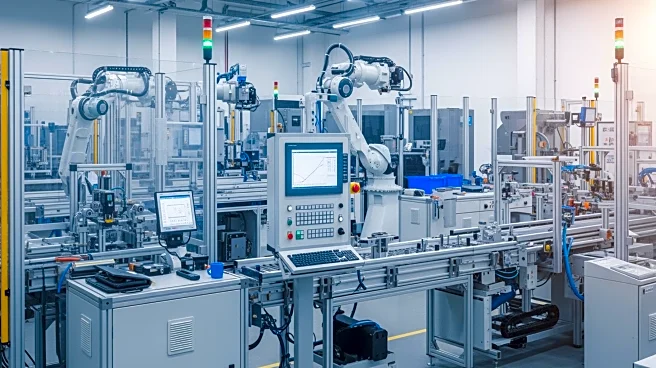What's Happening?
A 15-member Chinese delegation, led by the Organizing Committee of the China–Pakistan Safety Production Equipment Procurement Demand Matching Conference, visited Pakistan's Board of Investment (BOI) Project
Management Unit for Special Economic Zones (SEZs). The meeting, chaired by BOI PMU (SEZ) Director General Farah Farooq, focused on exploring new avenues for industrial cooperation and investment under the China–Pakistan Economic Corridor (CPEC). The session highlighted Pakistan's evolving investment landscape and the facilitation mechanisms available to investors in SEZs. The Chinese delegation expressed interest in establishing new manufacturing facilities and enhancing bilateral linkages. The meeting concluded with the exchange of Memoranda of Understanding and joint venture proposals, aligning with the 'Action Plan to Foster an Even Closer China-Pakistan Community with a Shared Future in the New Era (2025–2029)'.
Why It's Important?
This development is significant as it underscores the strengthening economic ties between China and Pakistan, particularly under the CPEC framework. The collaboration aims to advance Pakistan's industrialization agenda, potentially boosting economic growth and creating job opportunities. The establishment of new manufacturing facilities and enhanced bilateral linkages could lead to increased foreign direct investment in Pakistan. Additionally, the commitment to developing industrial parks and demonstration projects could position Pakistan as a key player in regional industrial cooperation. The involvement of Chinese enterprises in Pakistan's SEZs, supported by preferential policies, could further enhance the business environment and attract more international investors.
What's Next?
The next steps involve translating the discussions and agreements into concrete partnerships and projects. Both countries are expected to advance the development of industrial parks and demonstration projects as outlined in the Action Plan. China has pledged support for enterprises investing in Pakistan's SEZs, which could lead to the establishment of new manufacturing facilities. The framework also encourages third-party participation in CPEC cooperation, which could attract additional international stakeholders. The ongoing collaboration in sectors such as mining and export-oriented manufacturing is likely to continue, potentially leading to further economic integration between the two countries.
Beyond the Headlines
The deepening industrial cooperation between China and Pakistan could have broader geopolitical implications, potentially altering regional power dynamics. The CPEC initiative is a key component of China's Belt and Road Initiative, which aims to enhance global trade routes and economic connectivity. As Pakistan becomes more integrated into this framework, it may experience shifts in its economic and political alliances. Additionally, the focus on industrial development and export-oriented manufacturing could lead to significant changes in Pakistan's economic structure, potentially reducing its reliance on traditional sectors.










